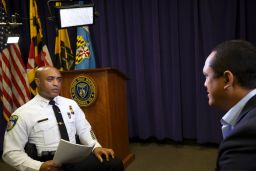Baltimore’s police commissioner says he didn’t know that six of his officers would face charges – some including second degree murder and manslaughter – in the death of Freddie Gray until 10 minutes before State’s Attorney Marilyn Mosby announced it on national television.
In his first interview after Gray’s death, Baltimore Police Commissioner Anthony Batts told CNN’s Evan Perez that the community lacks trust in law enforcement, and police must acknowledge that “we are part of the problem.”
“The community needs to hear that,” he said. “The community needs to hear from us that we haven’t been part of the solution, and now we have to evolve. Now we have to change.”
RELATED: Unrest in Baltimore as Obama pushes mentoring
In a subtle shot at Mosby, Batts compared the thoroughness of his investigation into Gray’s death – he said he assigned 45 to 50 officers to the case, pulling some off other homicides and robberies – to the state attorney’s much-smaller group.
Batts said Mosby had sought to limit leaks and avoid the perception that the state’s attorney was too close to police as she determined what charges to press against the officers who are accused of playing a role in Gray’s death.
“She didn’t want to be seen connected to the police organization, so the communication was limited as compared to what I’m used to,” he said.
Batts acknowledged a series of tactical mistakes as protests erupted last week that stemmed from a core problem: Baltimore police were not prepared for such massive demonstrations – particularly once they turned violent.
He said his officers sometimes lacked the shields, helmets and other gear they needed. At one point a group of officers advanced uphill against a rowdy group of protesters, at a disadvantage, Batts said. And his department hadn’t prepared for moving platoons of 200 to 300 officers at a time.
Batts said he was “probably surprised” to learn that six of his officers would be charged in the death of Gray, who was in police custody and had been refused medical attention.

“And then my mind started going to, what is going to be the response in community? … My officers, how do I keep them engaged, how do I keep them focused on getting their job done as a whole?” he said.
He wouldn’t discuss the details of Gray’s death, saying that while he’d like to make as much information public as possible to “take some of the steam out” of the community’s anger, the state’s attorney’s case might be harmed if too much is released.
More broadly, Batts said, Baltimore police – and law enforcement nationwide – must build trust with the urban communities they serve.
He also echoed comments from leaders like President Barack Obama who have asserted that a lack of strong educational opportunities has harmed African-American communities. He said if children can’t read by third grade, they stand little chance of finishing school.
“It’s not going to be an overnight thing,” said Batts, who is African-American.
He pointed to efforts already in place that include a program in which inner-city children receive meals and play sports with police officers. He said some officers are coaches and mentors already, and that he’d like to launch a program modeled after one in Los Angeles to have police officers working inside housing complexes.
“It’s going to be a long journey,” he said. “This isn’t going to be a short journey. You can see the distrust that’s out there, and we have to find inroads to sit down with people – to show care, to show empathy.”
Attorney General Loretta Lynch, who visited Baltimore on Tuesday, also sought to reassure law enforcement and the community the Justice Department who continue to help build ties long after the news cameras leave.



























































































